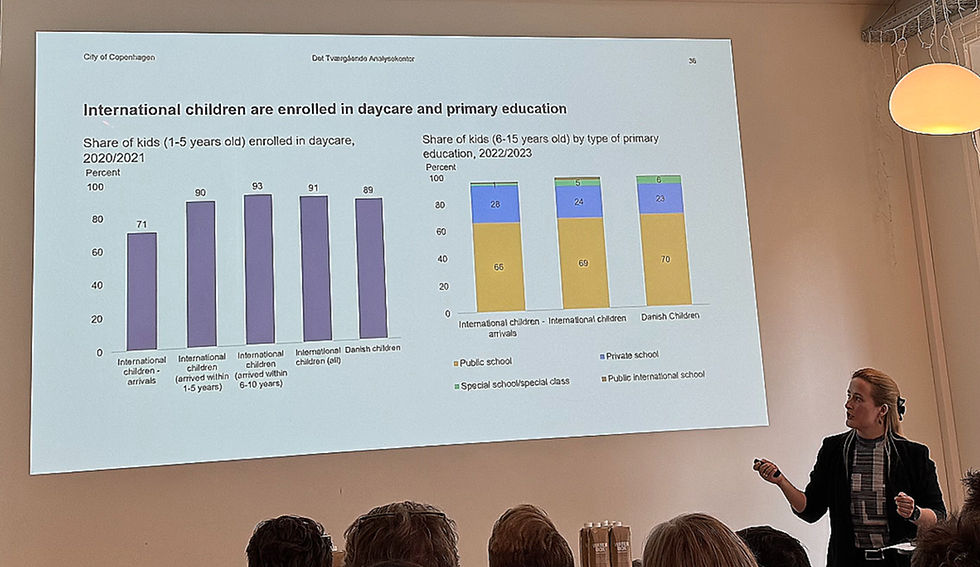Networking with and for Purpose
- Gizem Tore

- May 27, 2025
- 3 min read
Still reflecting on yesterday’s Expat Survey 2025 event by Copenhagen Capacity, in collaboration with The Copenhagen Post...
Copenhagen Capacity shared their findings about expat experiences in Denmark, the first major study of its kind in four years. Then city of Copenhagen presented its data followed by a panel discussion featuring Mia Nyegaard, Mayor for Culture and Leisure, Jens-Kristian Lütken, Mayor for Employment and Integration; and Bernardo Basilici Menini, Editor-in-Chief of The Copenhagen Post.
There’s no doubt that international talent plays a vital role in Denmark’s growth. The data speaks clearly: over DKK 150 billion contributed to GDP and 300,000 jobs filled by foreign workers in just the first half of 2024. And according to the City of Copenhagen, which holds the majority of the international workforce, it has doubled since 2012.
Accompanying Spouses
As an accompanying spouse navigating the beautiful, complex journey of settling in Denmark, I found the survey validating. It confirmed that I wasn’t alone in facing the challenges of integration. One of the relatable key findings: the expectation of good opportunities for one’s spouse is among the reasons for relocating to Denmark, yet one of the top areas where expectations fall short. The data also showed that accompanying spouses make up one of the highest percentages of long-term job seekers (22%), highlighting a systemic gap that affects families and talent retention.
On the other hand, KBH Kommune showed that the employment situation for accompanying spouses has nearly doubled in improvement since 2012. It was encouraging to see that efforts have been made and that they are having a positive impact.
Areas of Improvement
The Expat survey was a solid starting point and a snapshot of international experiences. But as one participant rightly noted, while it’s great to see this reality acknowledged, there’s still a need for deeper, actionable insights. How about the other side of the coin? What motivates Denmark to retain international talent? Can we listen and involve the other voices? What do institutions, employers, policymakers, and NGOs say about it?
Another perspective to bring is the touchpoints, and yes again systems thinking, service design and blueprinting (Do I sound like a broken record?) What systemic barriers are in place? Which systems are failing, and for whom? How about exploring innovative tools, like AI-powered platforms such as Pol.is (recently tested in the US and analysed by Google’s Jigsaw)? Read about the experiment here. Could they help identify shared priorities, areas for action and leverage co-creation?
Behavioural Barriers and DEI
As for the behavioural barriers discussed in the panel, I truly appreciate the Danish culture I’ve experienced so far: trust, collaboration, mutual respect, openness, and its introverted charm. It saddens me when critiques of the culture overshadow these values. Inclusion is deeply personal...As Mayor Mia Nyegaard humorously noted, most Danes would help if asked. But on the other hand, if discrimination or bias plays a role, as many suggest but struggle to pinpoint, then we should investigate and acknowledge it better, make it visible, and openly discuss it.
In this context, another data point presented by the Kommune was the enrollment rate of international children in public schools. Perhaps we shouldn’t wait until adulthood or workplace onboarding to address unconscious biases. DEI education should start in schools, especially considering that 69% of international children are enrolled in public schools and are part of the Danish education system.
Hvad Siger Du?
Mia Nyegaard also reminded us that Denmark is not a bilingual country, yet it provides many resources in English. Although I still struggle to master this phonetic language, I agree that it is crucial to learn the language of the country I call home. Perhaps there are better, more accessible ways to support language learning. It doesn’t need to involve a massive systemic change, simple initiatives like partnerships with elder care homes or children's institutions could offer meaningful, real-life opportunities while fostering integration.
Leaders with Humour and Heart
The inclusion of mayors on stage added a human and political dimension to the discussions. Their openness, approachability, and humane presence gave a great message and instilled hope for further initiatives. Even more encouraging was to see that a second-day workshop had been organised, giving space for co-creation and deeper reflection.
I also need to mention that Jens-Kristian Lütken, Mayor for Employment and Integration, was one of the panelists, with his baby in his arms. It was a charming and sincere moment that quietly proved Denmark's commitment to work-life balance. I only hope the little one wasn’t too overwhelmed by the crowd or the cameras.
Thank you to the researchers, organisers, and to the expats, spouses, students, and professionals who continue showing up with patience, honesty, and hope. This is how change begins.
Read the survey: Expat Survey 2025
“This post was created by me, from the initial idea to the final wording. It was polished by ChatGPT for grammar, clarity, and readability. You're always welcome to ask for the original version.”



